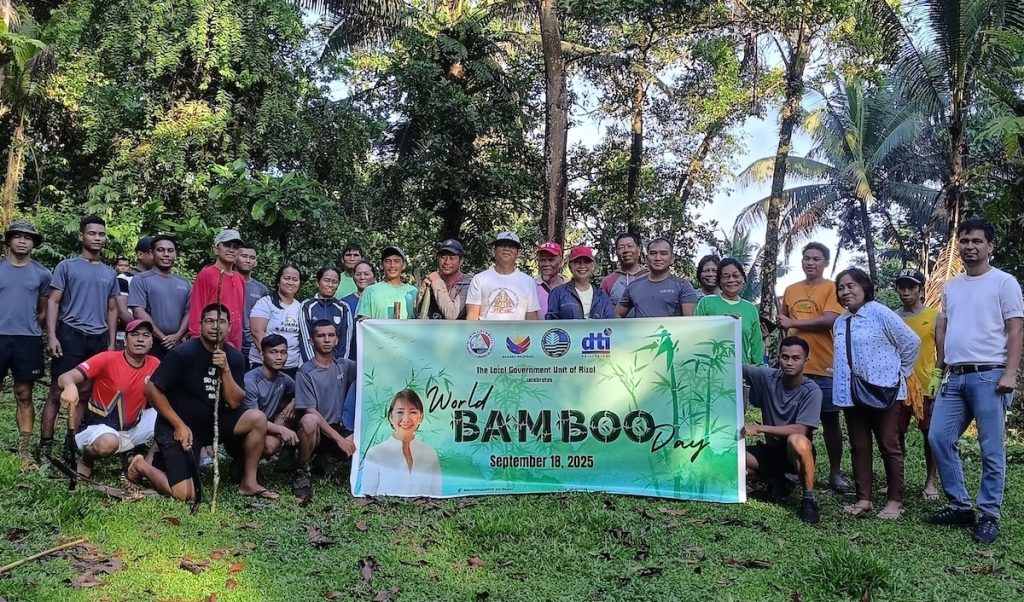
Out of Town Blog
Zamboanga del Norte town commemorates World Bamboo Day by planting 500 saplings.
In celebration of World Bamboo Day, the municipal government of Rizal, Zamboanga del Norte took a significant step towards environmental stewardship by planting 500 bamboo saplings. The initiative underscores the town’s ongoing commitment to promoting environmental sustainability, strengthening climate resiliency, and supporting local livelihoods.

The event saw the enthusiastic participation of 206 volunteers representing various government departments and uniformed services, who joined hands in the reforestation effort. The planting took place in the barangays of New Dapitan, Tolon, and Napilan, transforming open spaces and degraded areas into budding groves of bamboo, which are vital for soil stabilization and carbon sequestration.
“The activity affirms the municipality’s commitment through the promotion of bamboo as a nature-based solution and a sustainable industry resource in line with our vision of vision of becoming a hub for engineered bamboo industry development in the province,” says Rizal mayor Marissa Manigsaca.
She noted that, according to its Local Climate Change Action Plan (LCCAP), the town is highly vulnerable to flooding, rain-induced landslides, storm surges, and soil liquefaction.
She further explained that projected increases in rainfall variability and temperatures are expected to intensify these hydro-meteorological and geologic hazards. Addressing these issues calls for adaptive, sustainable solutions that both mitigate risks and bring ecological and economic benefits.
Aside from municipal employees, participants in the bamboo reforestation project included representatives from the Zamboanga del Norte Provincial Environment and Natural Resources Office (PENRO), local barangay officials, members of various socio-civic organizations, youth groups, and personnel from several key agencies such as the Philippine Army’s 97th Infantry Battalion, the municipal police station, and the Bureau of Fire Protection. Their involvement ensured a collaborative approach to environmental restoration and community participation.

The species selected for the reforestation effort was Giant Bamboo (Dendrocalamus asper), a fast-growing and resilient species renowned for its ecological and economic benefits. Its extensive root system effectively binds and stabilizes soil, making it highly effective for erosion control. Giant Bamboo also has significant value in the engineered bamboo industry, used in furniture, construction materials, and handicrafts, thereby offering livelihood opportunities to local communities. Moreover, it acts as a powerful carbon sink—absorbing carbon dioxide from the atmosphere—and plays a crucial role in climate change mitigation by sequestering greenhouse gases at higher rates compared to many tree species.
Manigsaca explained that demonstration farms and bamboo plantations will be set up on erosion-prone slopes, riverbanks, and idle lands. Bamboo’s extensive, fibrous root system binds soil particles tightly, which stabilizes the land, prevents soil erosion, and significantly reduces the risk of landslides. Additionally, bamboo can act as a natural barrier along riverbanks, helping to absorb excess rainwater and reduce flooding. These demo farms will serve to showcase best practices in bamboo cultivation and its environmental benefits.
“Rizal local government unit envisions bamboo as a core nature-based Solution (NBS), integrating ecological restoration with livelihood creation which is anchored on the Municipal Bamboo Development Framework and aligned with the LCCAP’s thrusts on ecological stability, water sufficiency, and climate-friendly industries,” The lady chief executive revealed.
She explained that, in accordance with the Framework, the local government unit (LGU) will advance the strategic expansion of sustainable plantations by identifying suitable land, incorporating ecological practices, and selecting appropriate crop varieties. In addition, the LGU plans to develop value-adding enterprises by promoting processing facilities, supporting product innovation, and facilitating access to broader markets. To strengthen local communities, initiatives will be undertaken to provide skills training and resources for livelihood integration tailored to residents’ needs. The LGU will also prioritize environmental impact, conducting regular assessments to ensure the protection and enhancement of the natural environment. Lastly, institutional support is set to include creating enabling policies, fostering inter-agency collaboration, and offering technical and financial assistance to stakeholders.
Manila Travel Tour Packages You Should Try
Klook.com
(function (d, sc, u) {
var s = d.createElement(sc),
p = d.getElementsByTagName(sc)[0];
s.type = “text/javascript”;
s.async = true;
s.src = u;
p.parentNode.insertBefore(s, p);
})(
document,
“script”,
“https://affiliate.klook.com/widget/fetch-iframe-init.js”
);
Follow and Subscribe to OutofTownBlog.com on Facebook, Twitter, Instagram, Pinterest, and YouTube for more Travel related updates.
Read: 10 Easiest Indoor Plants That Anyone Can Grow
Zamboanga del Norte town commemorates World Bamboo Day by planting 500 saplings.
Melo Villareal
Out of Town Blog
Please visit:
Our Sponsor


